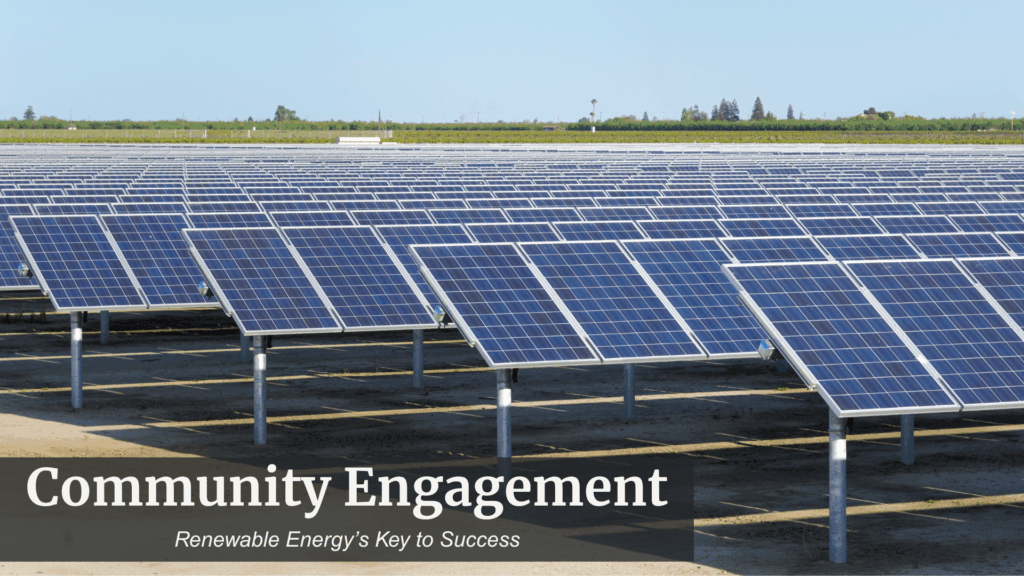Every renewable project depends on community trust. Without it, even the most well-funded initiative can stall or collapse. With it, projects move faster, face fewer regulatory hurdles, and gain long-term allies.
At Pyxera Global, we’ve seen how this works in practice: companies that invest in authentic partnerships with communities reduce risks and, most importantly, build the relationships that sustain growth over time.
Why Community Support Matters
When people are genuinely informed, included, and respected throughout the process, they help shape outcomes, and, in turn, become partners in progress rather than opponents. These partnerships can smooth permitting, reduce regulatory challenges, and even champion projects to their neighbors.
While this may sound like investing in “goodwill,” it’s good business strategy. Transparent, accountable engagement creates the foundation for lasting partnerships that extend far beyond a single project site.
The Cost of Getting It Wrong
When communities have a real voice in renewable projects, momentum builds. When they don’t, opposition can quickly emerge, resulting in costly delays and cancellations. About half of wind and solar projects face delays, with 20 percent taking longer than six years to complete and at least 30 percent never reaching completion.
In Sussex County, Virginia, public concern has resulted in delays and a reduced footprint in an industrial solar project’s size, with concerns around clearing trees and stormwater runoff. The developer, Clenera, changed the solar project as result of community concerns. According to Virginia Public Media, WHRO, Clenera made changes “that include reducing the overall size, nixing a battery storage facility that was originally proposed, leaving buffers of trees around the project and allowing the county to directly monitor construction.” As residents made clear, they weren’t opposing solar itself; they simply wanted safeguards for their surroundings.
While community engagement processes may draw out development timelines initially—with 67 percent of wind and 78 of solar developers experiencing this—the alternative often results in organized community opposition, proving far more costly and time-consuming in the end. Projects that fail to secure community buy-in frequently encounter extended legal challenges, regulatory setbacks, and ultimately higher costs than those that invest in upfront engagement.
An Investment Gap
Despite the clear evidence demonstrating the value of community engagement, the result is minimal action on behalf of developers. Renewable energy developers spend less than 0.1% of typical project capital expenditures on community engagement—less than one-third of what they spend on site control activities like determining the project’s location.
Engagement as a Competitive Advantage
Forward-looking companies are shifting their mindset: community engagement isn’t a regulatory box to check, but rather a strategic advantage. These companies understand that building trust requires a multi-stakeholder driven approach, bringing together governments, businesses, communities, and local organizations in collaborative frameworks.
Local communities hold valuable insights about environmental conditions, social dynamics, economic priorities, and cultural considerations that can significantly enhance project planning and implementation. They understand local supply chains, workforce availability, and potential partnerships that outside developers might overlook, making them essential partners.
From Ideas to Action
So how do companies move from principle to practice?
For renewable energy leaders, the message is clear: communities determine the fate of their projects. The smartest companies will recognize this reality and invest accordingly.
Pyxera Global’s community engagement programs offer an investment avenue to deliver actionable results. This program aligns industry goals with community needs – exploring the core challenges that can make or break renewable projects while still elevating community interests.
We have a history of working closely with our corporate partners to align their priorities with community-based organizations and strengthen relationships between corporate employees and community groups. A participant from one of our recent community engagement programs shared that “working with social entrepreneurs who are tackling systemic issues in their communities helped me understand the complexities of social change on a deeper level.”
The energy transition isn’t just about technology or finance; it’s about people. Communities aren’t obstacles to overcome; they’re partners who hold the key to success. By engaging authentically and building trust, renewable projects can move forward and endure. That’s the future we help our partners create.

Inga Bagepalli
Business Development Manager

